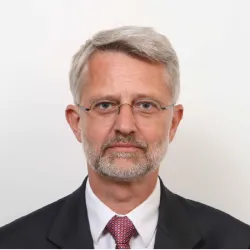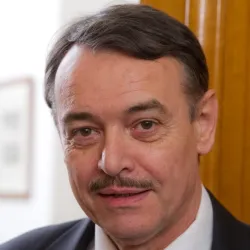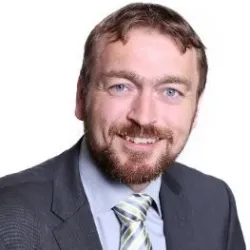2020 Internal Audit: Moving at the Speed of Innovation
Internal Audit: Moving at the Speed of Innovation
Internal Audit: Moving at the Speed of Innovation
November 16 - 17
Course Chair: Klaus Gressenbauer, former Director, Internal Audit, European Central Bank and Chairman of the Internal Auditors Committee, European System of Central Banks
In 2020, generational, technological changes and Covid-19 impact central banks operational frameworks and challenge views on the role of an internal audit function. Internal audit becomes a key resource and solution provider, working with internal and external stakeholders, at a time when conduct risk, ethical framework and institutional culture are being threatened.
How can internal audit contribute to good governance as central banks change? How can internal auditors balance support for policy and innovation with institutional resilience? And how can they as practitioners make the most of technology and opportunities in their frameworks and processes? These are some of the key questions that internal auditors face against a backdrop of technological and organisational disruptions.
This course, “Internal Audit: Moving at the Speed of Innovation” will provide central bankers with the toolkit to understand the varying roles of internal audit, the current disrupters to the function and measuring and monitoring performance through practical case studies and interactive group work.
Agenda
Participants will have access to pre-recorded presentations two weeks before the course
New challenges facing the internal audit function
Pre-recorded presentation
15:15 - 16:45
- Positioning audit in the governance structure of the organisation
- Understanding digital disruption and innovation and its effects on internal audit
- Overview of areas of accountability for internal audit
- What roles does internal audit play in helping management shape the culture of an institution?
Currently an international consultant in central banking and financial sector issues, Christian Durand was until 2018 deputy comptroller general of Banque de France, with direct reporting to the governor. His domain of responsibility included the audit function, operational risks and on-site inspections conducted by French examiners at the request of the Single Supervisory Mechanism (SSM) or the French banking supervision authority. Before that, he was deputy director general for economics and international affairs at the Banque de France, and in this context was a member of Banque de France Monetary and Financial Stability Policy Committees and regularly attended CGFS meetings at the BIS. During his career, Mr. Durand has held senior positions with the International Monetary Fund’s Monetary and Capital Markets Department, the French Banking Supervisory Authority and the French Securities and Futures Commission and led negotiations ending with the signing of MOUs with the US Securities and Exchange Commission (SEC) and Commodity Futures Trading Commission (CFTC). He has also worked extensively with financial institutions in France and other organizations, including the New York Federal Reserve Bank, the International Organization of Securities Commissions (IOSCO), FIRST initiative and the AFRITAC project. Through his different assignments he has developed a professional experience in central banking, international economics, financial supervision and financial sector development and stability issues. He has conducted or supervised the implementation of several technical assistance projects for the EU, the IMF or the Banque de France and led, for the IMF FSAP program, financial stability assessment missions in a wide range of countries starting with Cameroon in 1999 and ending with the United States in 2010. His academic education is in economics (thesis on “the concept of money in the controversies on capital, interest and fluctuations in the early thirties”), finance and law.
Navigating internal audit through the digital evolution
Pre-recorded presentation
10:45 - 12:15
- Use of big data and data analytics
- Data governance: how far should internal audit go to protect information security?
- Approaches and methodologies for auditing new IT technologies
- What is the application, infrastructure and processes?
Corporate culture: creation and reinforcement through shared values and behaviours
Pre-recorded presentation
13:30 - 15:00
- Is corporate culture defined or implied? What makes culture visible?
- The role of internal audit in driving corporate culture
- Effective strategies for measuring corporate culture
- Raising awareness on widespread impact culture has on institutions and approaches to auditing corporate culture
Overseeing central bank performance
Pre-recorded presentation
00:00 - 00:30
- Key areas where central banks need to deliver
- The role of the board in assessing performance
- Reporting frameworks: their content, frequency and what questions to ask
- Case study: critiquing examples of boards’ direct involvement
Times in GMT
11:00 – 11:30
Course introduction
Opening remarks with the course chair
00:00 - 00:30
- Introduction of the chairman
- Overview of the training course
- Discussion of the delegate expectations
11:30 – 12:30
Internal audit experience during covid-19
Participant discussion led by the chairman
00:00 - 01:00
- Participants to bring their experiences of Covid-19
- Challenges and opportunity in internal audit role and function
- Cultural changes
- How has the covid-19 pandemic impacted internal audit
Klaus Gressenbauer
Former director, internal audit, European Central Bank and chairman of the internal auditors committee
European System of Central Banks
Klaus Gressenbauer joined the European Monetary Institute in December 1997 and the European Central Bank (ECB) at its inception in 1998. He held a number of management positions in international banking, primarily in the area of controlling and general management. Upon joining the ECB Mr Gressenbauer first served as Director Planning & Organisation and was later on appointed Director Internal Audit. In his ECB capacity and prior to becoming Director Internal Audit, he inter alia also served as Chairman of the European System of Central Banks' (ESCD) Benchmarking Working Group, Chairman of the ESCB Organisational Analysis Working Group, member of the ECB Budget Committee, member of the ECB Management Committee, member of the ECB Project Steering Committee, member of the ECB Assets and Liabilities Committee and is now Chairman of the ESCB's Internal Auditors Committee. Mr Gressenbauer studied communication theories and philosophy and holds a PhD in political sciences from the University of Vienna. He also holds a Master of Business Administration degree from the International Management Institute in Geneva.
12:30 – 12:45
Break
00:00 - 00:15
12:45 – 13:45
What does a central bank board expect? A chairman’s view
Presentation followed by Q&A
13:30 - 15:00
- Assessing the complexities of the relationship between the board and the audit committee
- Key requirements for an effective board-audit relationship
- What do the reporting lines and communication channels look like?
- Discussion: Should internal audit be independent from executive management?
13:45 – 14:00
Break
00:00 - 00:15
14:00 – 15:00
Auditing cyber resilience: procedures and key indicators
Presentation followed by Q&A
13:15 - 14:45
- Case study: Example of a cyber attack
- Protocol for responding to a cyber attack
- How do you manage and mitigate cyber risk?
- What are the appropriate measures that can be put in place?
15:00 – 15:00
End of day 1
00:00 - 00:01
Times in GMT
11:00 – 12:00
Challenges for central banks’ auditors
Presentation followed by Q&A
17:15 - 18:45
-
AUDIT IN THE GOVERNANCE UNIVERSE
- Governance
- Audit contribution
- Audit and evaluation
-
STRATEGIC CHALLENGES
- Risk based versus cost based
- Audit of Projects
- Consulting services
-
TECHNICAL CHALLENGES
- Financial stability
- Digital risks
- Corporate culture
Currently an international consultant in central banking and financial sector issues, Christian Durand was until 2018 deputy comptroller general of Banque de France, with direct reporting to the governor. His domain of responsibility included the audit function, operational risks and on-site inspections conducted by French examiners at the request of the Single Supervisory Mechanism (SSM) or the French banking supervision authority. Before that, he was deputy director general for economics and international affairs at the Banque de France, and in this context was a member of Banque de France Monetary and Financial Stability Policy Committees and regularly attended CGFS meetings at the BIS. During his career, Mr. Durand has held senior positions with the International Monetary Fund’s Monetary and Capital Markets Department, the French Banking Supervisory Authority and the French Securities and Futures Commission and led negotiations ending with the signing of MOUs with the US Securities and Exchange Commission (SEC) and Commodity Futures Trading Commission (CFTC). He has also worked extensively with financial institutions in France and other organizations, including the New York Federal Reserve Bank, the International Organization of Securities Commissions (IOSCO), FIRST initiative and the AFRITAC project. Through his different assignments he has developed a professional experience in central banking, international economics, financial supervision and financial sector development and stability issues. He has conducted or supervised the implementation of several technical assistance projects for the EU, the IMF or the Banque de France and led, for the IMF FSAP program, financial stability assessment missions in a wide range of countries starting with Cameroon in 1999 and ending with the United States in 2010. His academic education is in economics (thesis on “the concept of money in the controversies on capital, interest and fluctuations in the early thirties”), finance and law.
12:00 – 12:15
Break
00:00 - 00:15
12:15 – 13:15
Efficient operations in a three line of defence setup
11:00 - 12:30
13:15 – 13:30
Break
00:00 - 00:15
13:30 – 14:30
Use the changed environment to newly brand IA
Presentation followed by Q&A
09:00 - 10:30
- How to use the current disruption to accelerate transformation?
- Understand key criteria for value addition
- Integrate with strategy and performance
- Partake in shaping the corporate culture
Klaus Gressenbauer
Former director, internal audit, European Central Bank and chairman of the internal auditors committee
European System of Central Banks
Klaus Gressenbauer joined the European Monetary Institute in December 1997 and the European Central Bank (ECB) at its inception in 1998. He held a number of management positions in international banking, primarily in the area of controlling and general management. Upon joining the ECB Mr Gressenbauer first served as Director Planning & Organisation and was later on appointed Director Internal Audit. In his ECB capacity and prior to becoming Director Internal Audit, he inter alia also served as Chairman of the European System of Central Banks' (ESCD) Benchmarking Working Group, Chairman of the ESCB Organisational Analysis Working Group, member of the ECB Budget Committee, member of the ECB Management Committee, member of the ECB Project Steering Committee, member of the ECB Assets and Liabilities Committee and is now Chairman of the ESCB's Internal Auditors Committee. Mr Gressenbauer studied communication theories and philosophy and holds a PhD in political sciences from the University of Vienna. He also holds a Master of Business Administration degree from the International Management Institute in Geneva.
14:30 – 14:45
Break
00:00 - 00:15
14:45 – 15:15
Networking break
15:30 - 16:00
Post training survey and feedback
00:00 - 00:30
CPE/CPD certificate
00:00 - 00:30
Course alumni group
00:00 - 00:30
Learning outcomes
By the end of the training course, participants will have gained new knowledge and a more comprehensive understanding of:
- Evolving internal audit landscape: governance in a digital age
- The role of internal audit measuring performance and managing change
- Examples of blockchain applications within internal audit
- How to audit innovation: a user’s guide
- Managing conduct risk and ethical frameworks: process of an internal enquiry
- Good practice, relations and coordination with external audit tools
- Understanding institutional resilience in terms of control, risk and audit

Chair

Klaus Gressenbauer
Chairman
Internal Auditors Committee European System of Central Banks
Klaus Gressenbauer joined the European Monetary Institute in December 1997 and the European Central Bank (ECB) at its inception in 1998. He held a number of management positions in international banking, primarily in the area of controlling and general management. Upon joining the ECB Mr Gressenbauer first served as Director Planning & Organisation and was later on appointed Director Internal Audit. In his ECB capacity and prior to becoming Director Internal Audit, he inter alia also served as Chairman of the European System of Central Banks' (ESCD) Benchmarking Working Group, Chairman of the ESCB Organisational Analysis Working Group, member of the ECB Budget Committee, member of the ECB Management Committee, member of the ECB Project Steering Committee, member of the ECB Assets and Liabilities Committee and is now Chairman of the ESCB's Internal Auditors Committee. Mr Gressenbauer studied communication theories and philosophy and holds a PhD in political sciences from the University of Vienna. He also holds a Master of Business Administration degree from the International Management Institute in Geneva.

